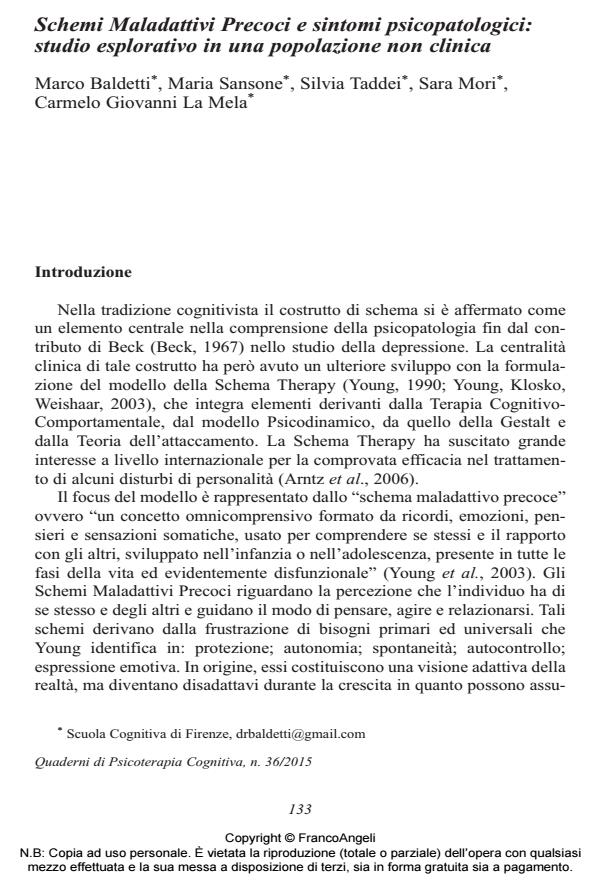Schemi Maladattivi Precoci e sintomi psicopatologici: studio esplorativo in una popolazione non clinica
Titolo Rivista QUADERNI DI PSICOTERAPIA COGNITIVA
Autori/Curatori Marco Baldetti, Maria Sansone, Sara Mori, Carmelo Giovanni La Mela
Anno di pubblicazione 2015 Fascicolo 2015/36
Lingua Italiano Numero pagine 11 P. 133-143 Dimensione file 109 KB
DOI 10.3280/QPC2015-036010
Il DOI è il codice a barre della proprietà intellettuale: per saperne di più
clicca qui
Qui sotto puoi vedere in anteprima la prima pagina di questo articolo.
Se questo articolo ti interessa, lo puoi acquistare (e scaricare in formato pdf) seguendo le facili indicazioni per acquistare il download credit. Acquista Download Credits per scaricare questo Articolo in formato PDF

FrancoAngeli è membro della Publishers International Linking Association, Inc (PILA), associazione indipendente e non profit per facilitare (attraverso i servizi tecnologici implementati da CrossRef.org) l’accesso degli studiosi ai contenuti digitali nelle pubblicazioni professionali e scientifiche.
L’interesse nei confronti della Schema Therapy (ST) e cresciuto in questi ultimi anni in relazione ai risultati di comprovata efficacia mostrati da questo tipo di trattamento nei confronti del disturbo borderline di personalita. Questi risultati hanno fatto puntare l’attenzione dei ricercatori su uno dei costrutti centrali della Schema Therapy, quello di schema maladattivo precoce (SMP) e sulla possibile relazione di questo con i sintomi psicopatologici. La Schema Therapy, infatti, ipotizza una relazione tra rigidita e pervasivita degli schemi ed il rischio di sviluppare una sofferenza psicopatologica (Young, 1990; Young et al., 2003). Il presente lavoro indaga la relazione tra Schemi Maladattivi Precoci e sintomi psicopatologici in un campione formato da 394 soggetti proveniente da una popolazione non clinica. I risultati, in linea con la letteratura di riferimento, confermano una relazione tra gli Schemi Maladattivi Precoci, indagati con lo Young Schema Questionnaire-Short form 3 (YSQ-S3), e le variabili misurate dal Symptom Check List (SCL-90) nella direzione attesa, confermando una correlazione tra SMP e sintomi psicopatologici.
Parole chiave:Schema Maladattivo Precoce, Young Schema Questionnaire, Schema Therapy
- Adverse Childhood Experiences and Early Maladaptive Schemas as Predictors of Cyber Dating Abuse: An Actor-Partner Interdependence Mediation Model Approach Laura Celsi, F. Giorgia Paleari, Frank D. Fincham, in Frontiers in Psychology 623646/2021
DOI: 10.3389/fpsyg.2021.623646
Marco Baldetti, Maria Sansone, Sara Mori, Carmelo Giovanni La Mela, Schemi Maladattivi Precoci e sintomi psicopatologici: studio esplorativo in una popolazione non clinica in "QUADERNI DI PSICOTERAPIA COGNITIVA" 36/2015, pp 133-143, DOI: 10.3280/QPC2015-036010